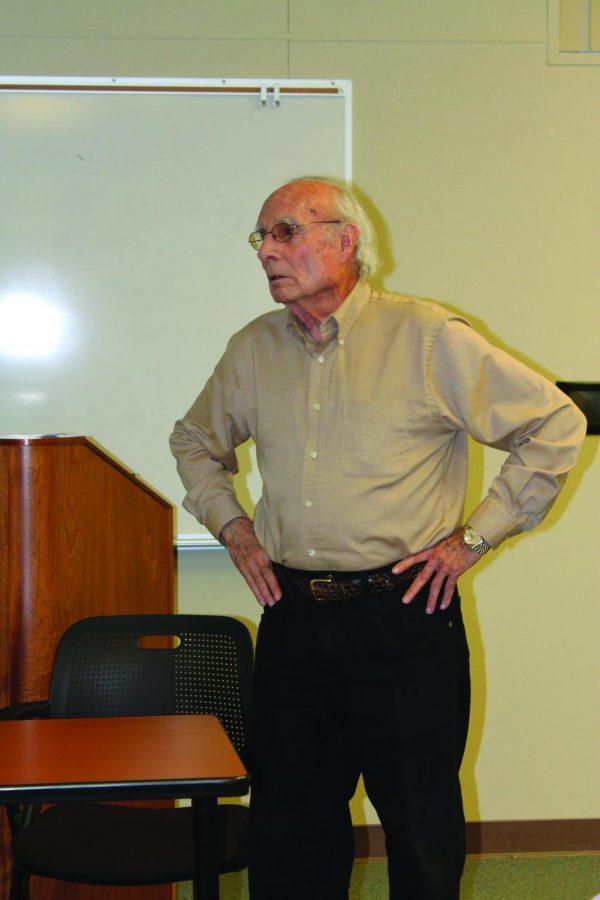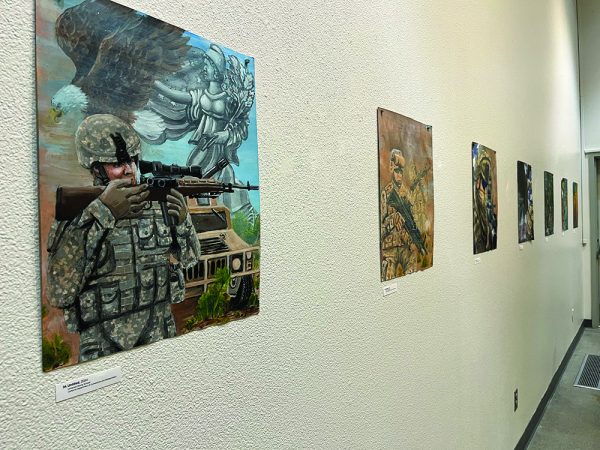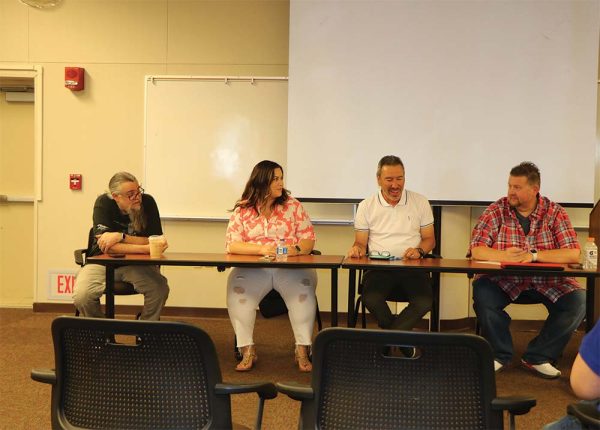BC students talk about current state of freedom of speech
Philosophy professor, Jack Hernandez, facilitates a discussion between panel members at the “Hate Speech and Freedom of Speech” event.
April 4, 2018
A conversation about freedom of speech versus hate speech was held on the campus of Bakersfield College on March 21 in the Levan Center.
The discussion is titled Hate Speech and Freedom of Speech and was moderated by Jack Hernandez and paneled by John Giertz, BC Professor of Communication, Erin Miller, BC Professor of History and Nicky Damania BC Director of Student Life.
The purpose of this event was to address the current climate of speech that potentially leads to racial injustice, sexual harassment, discriminatory practices and abuse of authority occurring frequently on college campuses across the nation.
As the event began Miller instructed students to fill-out the strip of paper located on each seat. Each slip of paper had questions on them that were developed to drive the conversation about hate speech and freedom of speech.
Hernandez said, “Students think that free speech rights are very important to society, but nearly half the students believe that they are in favor campus speech codes. And furthermore 2/3s feel that the constitution should not protect hate speech like racial slurs.”
After Jack told a brief story about students who wore costumes for Halloween that mimicked stereotypes of specific demographics. He directed John Giertz to initiate the conversation about Freedom of speech versus hate speech. As he stood and read about the various cases and statistics where the freedom of speech was challenged due to the offensive nature and perceived by the group identified in the speech as hate speech.
Giertz delivered a levy of terms and definitions that are deemed protected under the constitutional clause known as free speech. Terms like abstract ideas, advocacy of unpopular ideas, imminent lawless action, breach of the peace, fighting words and liable language were defined and elaborated on as to provide a clear understanding what was protected under the language of the Constitution and Bill of Rights.
Professor Giertz said, “I had the most unpleasant opportunity to be accosted by the West Burrow Baptist church. As I was leaving when I went to a funeral in town for military. As I was leaving they actually crossed the street, which was a violation, but they approached me and my son to tell us that we were going to hell for having attend that [funeral]….I responded I don’t love you very much, but for some reason Jesus does.”
Damania shared a story about an English professor was found to show traits of biasness when grading student papers covering the topic of same sex marriage. He said, “Those students who were against same sex marriage earned higher grades than those groups of students who wrote papers supporting same sex marriages.”
Although professors and students are protected by academic freedom in a scholarly setting, which allows the students and professors to engage in discord covering sensitive content with the intent to drive in depth dialogue and surface potential resolutions. Students are able to express their perspective until it infringes on the rights of others or violates a contractual agreement agreed upon. Professors are held to a standard of professionalism that allows controversial content under the guise of approved curriculum.
Erin Miller professor of history, was the final panelist to present and she said to the audience, ”today is designed to provoke you”. The attendees were again reminded that some of the content she would be sharing could be provoking and controversial.
“I don’t see anything in the constitution that entitles any of us to the freedom not to be offended. You do not have the right to be protected from views that are offensive to you and according to the Supreme court there is no such thing as hate speech. This is not about hate speech but about control”, she said.
Miller went on to tell a story about a student who was kicked out of a class about religion for stating that, gender is biological. She said, “The discussion of hate speech is about control and descent. A threat to the republic.” She went on to pose the question of why would the founders select the freedom of speech as the first amendment. “There is no such thing as hate speech”, she said. Miller went on to discuss a case concerning Clarence Brandenburg.
“This guy Brandenburg is this is the example all of us think of when we think of hate speech. Leader of the KKK, wears a white hood, burns crosses, has a big gathering talking about getting vengeance on [n-word] and killing the Jews and it is clearly hate speech”, she said.
It went all the way to the supreme court and it was determined as free speech, setting a precedence as this practice was protected under abstract ideas. She finished by saying that the liberty of conscience is under attack by a Cabal that seeks to maintain the republic by restricting free speech of the people. And that it is the responsibility of the people to perpetuate the conservative views, liberal views, offensive views, and religious views that avail to freedom of speech.
Free speech; Congress shall pass no law respecting an establishment of religion or prohibiting the free exercise thereof; or abridging the freedom of speech, or of the press: or the right of the people peaceably to assemble, and to petition the Government for redress of grievances.










